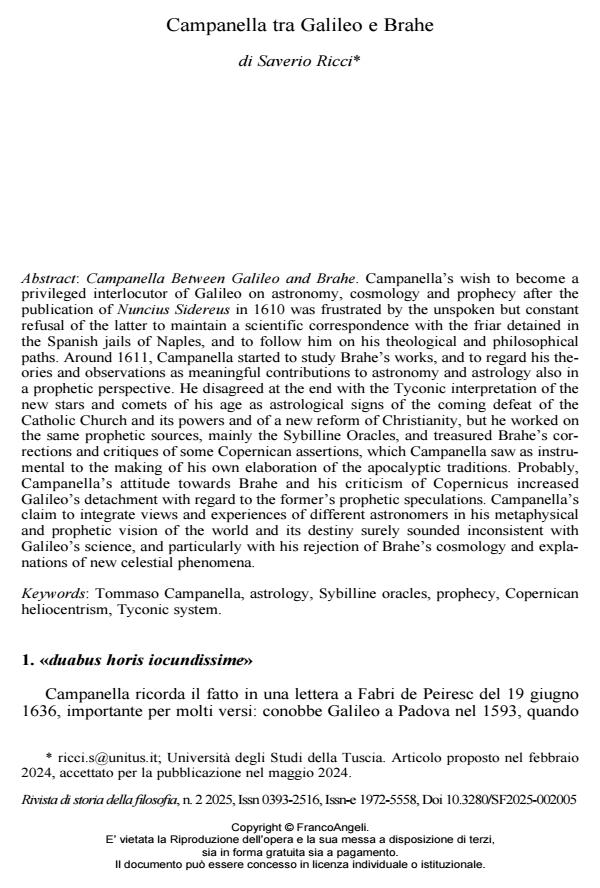Campanella Between Galileo and Brahe
Journal title RIVISTA DI STORIA DELLA FILOSOFIA
Author/s Saverio Ricci
Publishing Year 2025 Issue 2025/2
Language Italian Pages 25 P. 238-262 File size 340 KB
DOI 10.3280/SF2025-002005
DOI is like a bar code for intellectual property: to have more infomation
click here
Below, you can see the article first page
If you want to buy this article in PDF format, you can do it, following the instructions to buy download credits

FrancoAngeli is member of Publishers International Linking Association, Inc (PILA), a not-for-profit association which run the CrossRef service enabling links to and from online scholarly content.
Campanella’s wish to become a privileged interlocutor of Galileo on astronomy, cosmology and prophecy after the publication of Nuncius Sidereus in 1610 was frustrated by the unspoken but constant refusal of the latter to maintain a scientific correspondence with the friar detained in the Spanish jails of Naples, and to follow him on his theological and philosophical paths. Around 1611, Campanella started to study Brahe’s works, and to regard his the- ories and observations as meaningful contributions to astronomy and astrology also in a prophetic perspective. He disagreed at the end with the Tyconic interpretation of the new stars and comets of his age as astrological signs of the coming defeat of the Catholic Church and its powers and of a new reform of Christianity, but he worked on the same prophetic sources, mainly the Sybilline Oracles, and treasured Brahe’s cor- rections and critiques of some Copernican assertions, which Campanella saw as instru- mental to the making of his own elaboration of the apocalyptic traditions. Probably, Campanella’s attitude towards Brahe and his criticism of Copernicus increased Galileo’s detachment with regard to the former’s prophetic speculations. Campanella’s claim to integrate views and experiences of different astronomers in his metaphysical and prophetic vision of the world and its destiny surely sounded inconsistent with Galileo’s science, and particularly with his rejection of Brahe’s cosmology and expla- nations of new celestial phenomena.
Keywords: Tommaso Campanella, astrology, Sybilline oracles, prophecy, Copernican heliocentrism, Tyconic system.
Saverio Ricci, Campanella tra Galileo e Brahe in "RIVISTA DI STORIA DELLA FILOSOFIA" 2/2025, pp 238-262, DOI: 10.3280/SF2025-002005